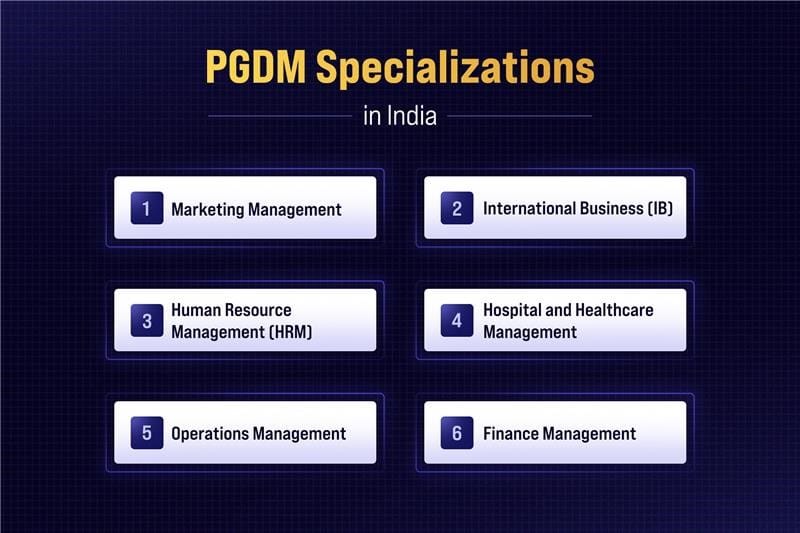Can I do an MBA after a Diploma?

Many students who complete a diploma in engineering, IT, or other fields often wonder whether they can pursue an MBA (Master of Business Administration). The short answer is yes, but there are specific conditions that must be met. In India, a diploma alone typically doesn’t meet the eligibility criteria for enrolling in a full-time, regular MBA program.
This is because, according to the Supreme Court’s ruling and the eligibility norms followed by most universities, an MBA requires a 10+2+3 education pattern, meaning candidates must have a three-year bachelor’s degree after class 12.
However, diploma holders still have options to pursue management education through alternative pathways such as PGDM (Post Graduate Diploma in Management) or online MBA programs with work experience.
In this article, we will explore why pursuing an MBA after a diploma is worth considering, along with alternative options and the career opportunities available to you.
If you’re exploring what to do next after your current education, an MBA isn’t the only option. Our Post Graduate Program (PGP) at Altera is designed to build real-world skills, boost confidence, and prepare you for exciting career opportunities. You can learn more about the program on our homepage.
How can students with a Diploma pursue Business education?
A business education program generally requires students to hold a three-year undergraduate degree as a prerequisite. But here is how a student with a diploma can do it:
- Pursue a lateral entry into a bachelor's degree: Many universities offer lateral entry into the second year (or third semester) of a bachelor's degree for diploma holders. This helps you save time instead of starting from the first year.
- Apply for an online or distance MBA: Some institutes offer online or distance MBA programs that accept diploma holders with relevant work experience, even if they do not hold a bachelor’s degree. These programs are ideal for working professionals seeking to develop business management skills.
- PGDM (Post Graduate Diploma in Management) instead of MBA: Most PGDM colleges require a bachelor’s degree (10+2+3), but some institutions may admit diploma holders with substantial work experience (typically 5+ years) to be considered.
Why should you do an MBA?
While a diploma helps you gain technical skills and hands-on experience, an MBA equips you with leadership abilities, business acumen, and strategic thinking—essential qualities for career growth.
The following are the best reasons why doing an MBA after a diploma is a sound decision:
- Greater Salary and Career Advancement: A diploma will give you an entry-level job, but with an MBA, you can access better-paying managerial jobs. MBA graduates are paid much higher because they become responsible for decision-making, project management, and strategic planning, which are qualities treasured by companies.
- International Opportunities: MBA is known to be global, and you can work in multinationals and global start-ups as well as seek employment in other countries. Most leading firms are aggressively seeking MBA graduates for managerial roles.
- Specialization in Business Areas: Unlike a diploma that focuses on technical knowledge, an MBA allows you to specialize in finance, marketing, HR, business analytics, operations, and more. Such specializations help you gain expertise in a specific domain, significantly boosting your employability.
- Build a Strong Professional Network: An MBA isn’t solely about academics—it’s equally about forging valuable connections with peers, alumni, and industry leaders. You’ll connect with industry leaders, entrepreneurs, and business professionals, creating opportunities for job placements, partnerships, and business ventures.
- Learn Leadership & Problem-Solving Skills: Employers prefer MBA graduates because they are trained in critical thinking, decision-making, leadership, and problem-solving. In today's fiercely competitive corporate landscape, these competencies are essential and help you stand out from other candidates.
- Adapt to Changing Industries: Technology and business trends evolve rapidly, and an MBA helps you stay updated with the latest industry practices. Whether it's digital marketing, AI in business, or financial technology, an MBA ensures you are ready for the future.
How to Get a PGDM After a Diploma?
PGDM (Post Graduate Diploma in Management) programs are industry-oriented and considered equivalent to an MBA if pursued from AICTE-approved institutions. Note that just like an MBA, a PGDM course also requires a bachelor's degree first.
However, diploma holders with at least 5 years of work experience can still pursue specific PGDM courses offered by reputable institutions. Since institutions have different prerequisites, students must always check the course's eligibility criteria before applying.
Eligibility for PGDM After Diploma:
- A bachelor’s degree (10+2+3) is mandatory.
- Some institutes allow diploma holders with work experience.
- Admission through entrance exams such as CAT, MAT, CMAT, or GMAT.
List of PGDM Specializations in India

The decision of the appropriate specialization of the PGDM is the most important one in terms of career development because it is the specialization in which you will probably succeed. The best 6 specializations of the PGDM, their significance, and available career opportunities are as follows:
- Marketing Management: This major best suits students who have a passion for brand building, consumer behavior, and market research. The topics to be covered in the program include digital marketing, sales, product management, and advertising techniques, which graduates can use to work in a dynamic marketing environment.
- International Business (IB): With the increased pace of globalization, companies are now operating internationally, and hence the necessity of professionals in business who are savvy in international trade, international business strategies, and the operations of international business. The specialization is designed for those interested in international markets, trade regulations, and foreign business policies.
- Human Resource Management (HRM): HRM plays a key role in the proper operation of any organization, dealing with hiring, employee participation, performance, and workplace policies. This specialization suits people who are most effective in people-oriented jobs and those with talent management skills.
- Hospital and Healthcare Management: Healthcare is one of the fastest-growing industries, and it requires competent experts to manage hospitals, pharmaceutical firms, and healthcare facilities effectively. This concentration encompasses hospital management, health policy frameworks, bioethical considerations, and medical data systems.
- Operations Management: Operations management is concerned with business processes, supply chain efficiency, and logistics to facilitate efficient production and delivery of services. Such specialization is essential to industries such as manufacturing, retail, e-commerce, and service management.
- Finance Management: It is an ideal field of study for those interested in financial planning, investment strategies, risk management, and corporate finance. It encompasses major subjects such as financial analysis, portfolio management, banking operations, and economic policy, preparing graduates for investment banking, financial consulting, and corporate finance.
The different specializations of the PGDM have distinct opportunities that one can pursue based on his or her interests and career aspirations. The appropriate specialization should be chosen based on your strengths, goals, and market trends.
Career and Scope of the PGDM Course
The Post Graduate Diploma in Management (PGDM) is a career-oriented course like the MBA in most respects. It unlocks diverse professional pathways across both corporate and governmental sectors. However, always verify the eligibility criteria of the specific PGDM courses you are interested in, as requirements can vary between institutions.
Why Choose PGDM?
- Offers specialized knowledge in marketing, finance, HR, business analytics, and any other specialization of the student’s choice.
- Acquisition of problem-solving, decision-making, and leadership.
- Enhances employability with practical exposure, internships, and industry-relevant training.
- Gives a chance of entrepreneurship and business leadership.
Jobs After Postgraduate Diploma in Management:
A PGDM degree provides access to various sectors, and graduates can assume leadership positions in them. The best career opportunities are:
1) Managerial Roles in Top Private Organizations
Various multinational corporations (MNCs) and corporate organizations are specifically targeting PGDM graduates for managerial roles. These experts operate in marketing, finance, sales, operations, and human resources to ensure smooth operations of businesses.
2) Business Analysts and Consultants
Graduates of PGDM programs with a strong background in mathematics, analytics, and strategy development tend to work in research organizations or consulting firms. They examine business performance, recognize areas of business growth, and offer strategic solutions.
3) Government Sector Jobs
PGDM graduates have attractive prospects in the manufacturing, banking, and service sectors. Government agencies need many professionals to work in policy planning, finance, and administration.
4) Entrepreneurship and Startups
Aspiring entrepreneurs could find a PGDM a very good base to start and develop their businesses. The course builds key competencies such as financial management, operations strategy, and risk assessment, which are essential for launching an effective startup.
5) Careers in Education and Training
Higher education institutions and professional coaching centers often hire PGDM graduates as faculty members, corporate trainers, or business consultants. This sector provides stable career opportunities with excellent earning potential.
Online MBA after Diploma Program Overview
Most accredited universities require a bachelor’s degree (10+2+3) to join an MBA program, whether online or full-time. However, this is not a usual practice; diploma holders with extensive work experience may be accepted at some private institutes. Therefore, diploma students should either complete a bachelor's degree through lateral admissions or have considerable work experience to qualify.
The main Advantages of an Online MBA Following a Diploma:
- Career Development: Enhances employment opportunities and access to top management.
- Increased Earning Potential: Higher qualifications often translate into higher salary packages and greater financial stability.
- Industry Transition Opportunities: Facilitates a career shift into new sectors or specialized functions.
- Leadership Development: Enhances decision-making, problem-solving, and strategic thinking abilities.
- Flexibility and Accessibility: Enables professionals to pursue education without disrupting their work or personal commitments.
- Networking Opportunities: Helps connect with experts, alumni, and peers in the industry using online platforms as well as virtual interactions.
Eligibility Criteria
Admission to an online MBA program after a diploma depends on work experience. While eligibility criteria may vary across institutions, the general requirements include:
- Candidates with less than two years of experience may be required to clear an entrance examination.
- A two-year diploma may require a minimum of five years of work experience for eligibility.
- Candidates with a 10th-grade education and a three-year diploma must have 5-7 years of relevant work experience to qualify.
- Institutions can also provide an assessment using a Recognition of Prior Learning (RPL) application procedure for cases that do not meet the standard requirements.
FAQs
Q1. What is the best degree to have after a diploma?
Ans: Once you have done a diploma, the most preferable degree depends on your career goals and interests. The most common and organized one is the bachelor's degree (BTech, BBA, BCom, BSc, etc.). This allows you to gain a deeper understanding of your domain and meet eligibility criteria for further education, such as an MBA or PGDM. Alternatively, for those looking to enter management roles, a PGDM or a specialized certification course can also be beneficial.
Q2. Can I do a master’s degree after a 3-year diploma?
Ans: No, to join a master's degree program, such as an MBA or MTech, directly, a diploma would not be enough. The majority of universities traditionally require a 10+2+3 pattern for a bachelor’s degree to be admitted to master's programs.
Summing Up
The decision to pursue an MBA immediately after a diploma is a good career progression, though one must be careful when undertaking it. The diploma is not sufficient to meet the eligibility requirements for a conventional MBA; students must seek other options, such as pursuing a bachelor's degree, a PGDM, or an online MBA with work experience.
All these options offer distinct benefits and help professionals become better leaders, acquire business knowledge, and pursue higher employment opportunities. An MBA or PGDM prepares people with a strategic mindset, decision-making skills, and industry-specific knowledge, making them an asset in business.





